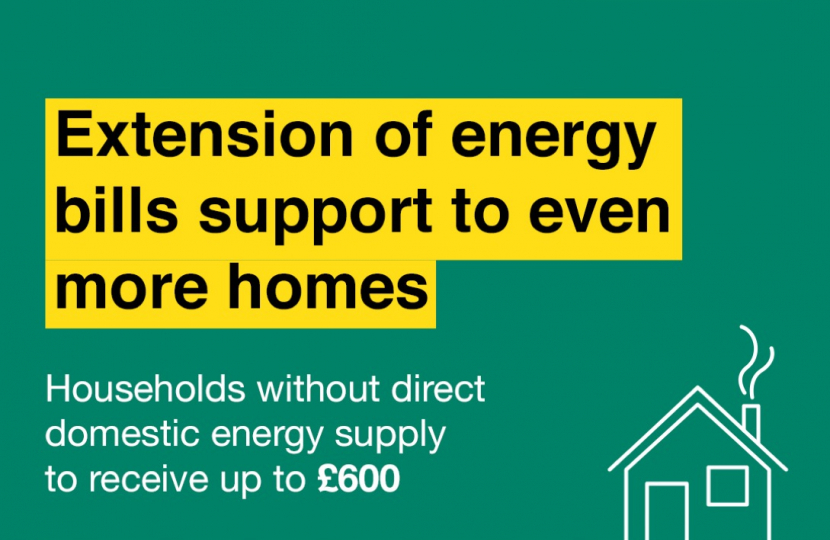
Energy bills support via EBSS Alternative Funding and Alternative Fuel Payments
As well as this support for homes across Northern Ireland, the government has also announced details today for how people in England, Scotland and Wales without a direct relationship to a domestic energy supplier, including many care home residents and those living in park homes, will receive a £400 discount on their fuel bills through the Energy Bills Support Scheme Alternative Funding (EBSS Alternative Funding).
The government is also providing a further £200 Alternative Fuel Payment (AFP) to help those households in Great Britain who use alternative fuels such as biomass or heating oil to meet energy costs this winter. Most households eligible for the AFP support in Great Britain, will receive payment automatically via their electricity supplier in February, with no need to take any action. Those households who will need to apply for the AFP, for example because they do not have a relationship with an electricity supplier, will be able to do so in February, through the same GOV.UK portal as the one that will be used to apply for support under the EBSS Alternative Funding scheme.
Minister for Energy and Climate, Graham Stuart, said:
Getting this support for households’ bills out across the country will save hundreds of pounds for millions of people during the coldest months of the year.
This has been a top priority and joint effort, with close work between officials and electricity suppliers in Northern Ireland, as well as with local authorities in Great Britain who will help get support to over 900,000 households who don’t have the direct relationship with energy suppliers that the vast majority of households do.
Online applications will open in January for households in England, Scotland and Wales who are eligible for the £400 EBSS Alternative Funding to submit their details, alongside a helpline for those without online access. Payments to households that meet the eligibility criteria – including people who get their energy through a commercial contract or who are off-grid – will be made by local authorities in Great Britain. This is likely to include:
- care home residents
- residents of park homes
- tenants in certain private and social rented homes
- homes supplied via private wires
- residents of caravans and houseboats on registered sites
- farmers living in domestic farmhouses
- off-grid households
Most households who don’t have a direct relationship with a domestic energy supplier have already been benefitting from subsidised energy bills through the government’s business support scheme, with the Energy Prices Act legislation passed earlier in the year to ensure those benefits are passed on to consumers who do not pay their energy bills directly.
To make the process as simple as possible for consumers, those who are eligible for the EBSS Alternative Funding will need to submit a short online form via the government’s GOV.UK pages, with the application portal due to open in January.
A dedicated customer helpline will be available to assist customers who do not have online access, with further details to be released next month. Customers who are eligible for support under the main Energy Bills Support Scheme are not eligible for EBSS Alternative Funding.
Once customers have applied to receive support and their applications have been processed and verified, eligible customers’ details will be shared with local authorities across England, Scotland and Wales, who will deliver the one-off, non-repayable support this winter.
Applicants will only be able to submit information through GOV.UK from January and should not contact their local authority in the meantime. The exact date that an eligible household will receive support will depend on when the application is made and when the payment can be processed by the relevant local authority.
Existing support for energy bills this winter
As well as discounts provided through the EBSS and Alternative Fuel Payments, the government’s Energy Price Guarantee (EPG) will save a typical household in Great Britain around £900 this winter, based on what energy prices would have been under the current price cap – reducing bills by roughly a third.
For households in Northern Ireland, the Energy Price Guarantee is already providing equivalent support to the rest of Great Britain – helping those using gas and electricity save around £550 this winter. Further support in direct payments is also being provided to vulnerable households this year, including cost of living payments for pensioners, people receiving disability-related allowances and those on means-tested benefits.
The Household Support Fund provides additional assistance for those most in need and £26 billion worth of targeted support will help protect the most vulnerable in the next financial year.
Energy Bills Support Scheme Alternative Funding (EBSS AF)
The GOV.UK page launching in January 2023 will include an overview of eligibility and what applicants need to do to apply for energy bills support under the EBSS alternative funding scheme.
Subject to applications meeting the eligibility criteria, people who will be able to receive support under the EBSS AF delivered by local authorities, include:
- care home residents and others in care facilities/sheltered accommodation (wholly or partly self-funded)
- park home residents, houseboats and caravans that can provide proof of address
- social and private tenants who pay for energy through a landlord on a commercial supply
- travellers
- homes on a heat network/private wire
- off-grid homes
- farmhouses used for wholly domestic purposes
Alternative Fuel Payment (AFP) scheme
Approximately 2 million households in the UK use alternative fuels for heating, of which around 1.7 million use heating oil as a source of energy.
Other alternative fuels include coal, liquified petroleum gas (LPG) and biomass.
The UK government announced in the Autumn Statement that it will double support to £200 for households using alternative fuels to heat their homes, in recognition of the pressures caused by these rising fuel costs. In a further step, it also committed to paying the Alternative Fuel Payment to all households in Northern Ireland to get payments as quickly as possible to those who rely on these sources to heat their homes – this is most households in Northern Ireland (68%).
The vast majority of households eligible for the Alternative Fuel Payment scheme in Great Britain will receive payment automatically via their electricity supplier with no need to take any action.
For the small number of customers who are unable to receive the funding automatically, for instance households in Great Britain without a direct relationship with an electricity supplier, the government will ensure there is a route for those households to apply for and receive the £200 support.

